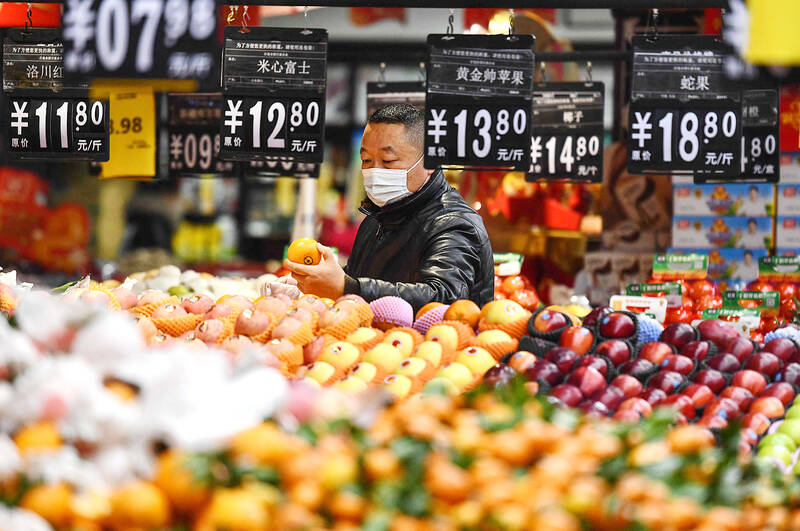Chinese consumer prices fell last month at their quickest rate in more than 14 years, data showed yesterday, piling pressure on the government for more aggressive moves to revive the country’s battered economy.
The 0.8 percent drop in the consumer price index, announced by the National Bureau of Statistics, marked the fourth straight month of deflation and was much bigger than the 0.5 percent fall forecast in a survey by Bloomberg News.
The reading was the worst since the second half of 2009, during the global financial crisis.

Photo: AFP
Meanwhile, a 2.5 percent plunge in the producer price index — which measures the cost of goods leaving factories — signaled continued weakness.
China slipped into deflation in July last year for the first time since 2021 and, apart from a brief rebound in August, has been in constant decline since.
“The primary drag on inflation continued to be food prices, which fell by 5.9 percent year-on-year, the lowest level on record,” ING Bank NV chief economist for Greater China Lynn Song said.
However, he pointed to figures showing costs rising month-on-month.
“While a far cry from the above-target inflation levels seen in many other economies, these numbers do not imply China is stuck in a deflationary spiral,” Song said in a note.
“We see a high likelihood that January’s data could mark the low point for (year-on-year) inflation in the current cycle.”
China’s sinking prices are in stark contrast with the rest of the world, where inflation remains a persistent bugbear, forcing central banks to ramp up interest rates.
While deflation suggests goods are cheaper, it poses a threat to the broader economy as consumers tend to postpone purchases, hoping for further reductions.
A lack of demand can then force companies to cut production, freeze hiring or lay off workers, while potentially also having to discount existing stocks — dampening profitability even as costs remain the same.
In reaction to the woes in the world’s number two economy, markets have been among the worst-performing globally in recent months.
On Wednesday, China Securities Regulatory Commission chairmen Yi Huiman (易會滿) was replaced after overseeing a sell-off that has wiped trillions off companies’ valuations.
The losses have prompted pledges of support, with Chinese President Xi Jinping (習近平) also becoming more involved, though observers say the moves would not solve the country’s deeper economic problems, which needed to be addressed to fully restore optimism.
Stocks in mainland China rallied for a third straight day Thursday as traders welcomed the replacement of Yi, hoping for more action to kickstart a recovery.
The Shanghai Composite Index climbed 1.28 percent, or 36.21 points, to 2,865.90 on the last day before a week-long Lunar New Year break, and the Shenzhen Composite Index on China’s second exchange rose 3.17 percent, or 48.42 points to 1,577.33.
However, the Hang Seng Index in Hong Kong sank 1.27 percent, or 203.82 points, to 15,878.07.

Hon Hai Precision Industry Co (鴻海精密) yesterday said that its research institute has launched its first advanced artificial intelligence (AI) large language model (LLM) using traditional Chinese, with technology assistance from Nvidia Corp. Hon Hai, also known as Foxconn Technology Group (富士康科技集團), said the LLM, FoxBrain, is expected to improve its data analysis capabilities for smart manufacturing, and electric vehicle and smart city development. An LLM is a type of AI trained on vast amounts of text data and uses deep learning techniques, particularly neural networks, to process and generate language. They are essential for building and improving AI-powered servers. Nvidia provided assistance

GREAT SUCCESS: Republican Senator Todd Young expressed surprise at Trump’s comments and said he expects the administration to keep the program running US lawmakers who helped secure billions of dollars in subsidies for domestic semiconductor manufacturing rejected US President Donald Trump’s call to revoke the 2022 CHIPS and Science Act, signaling that any repeal effort in the US Congress would fall short. US Senate Minority Leader Chuck Schumer, who negotiated the law, on Wednesday said that Trump’s demand would fail, while a top Republican proponent, US Senator Todd Young, expressed surprise at the president’s comments and said he expects the administration to keep the program running. The CHIPS Act is “essential for America leading the world in tech, leading the world in AI [artificial

DOMESTIC SUPPLY: The probe comes as Donald Trump has called for the repeal of the US$52.7 billion CHIPS and Science Act, which the US Congress passed in 2022 The Office of the US Trade Representative is to hold a hearing tomorrow into older Chinese-made “legacy” semiconductors that could heap more US tariffs on chips from China that power everyday goods from cars to washing machines to telecoms equipment. The probe, which began during former US president Joe Biden’s tenure in December last year, aims to protect US and other semiconductor producers from China’s massive state-driven buildup of domestic chip supply. A 50 percent US tariff on Chinese semiconductors began on Jan. 1. Legacy chips use older manufacturing processes introduced more than a decade ago and are often far simpler than

Gasoline and diesel prices this week are to decrease NT$0.5 and NT$1 per liter respectively as international crude prices continued to fall last week, CPC Corp, Taiwan (CPC, 台灣中油) and Formosa Petrochemical Corp (台塑石化) said yesterday. Effective today, gasoline prices at CPC and Formosa stations are to decrease to NT$29.2, NT$30.7 and NT$32.7 per liter for 92, 95 and 98-octane unleaded gasoline respectively, while premium diesel is to cost NT$27.9 per liter at CPC stations and NT$27.7 at Formosa pumps, the companies said in separate statements. Global crude oil prices dropped last week after the eight OPEC+ members said they would